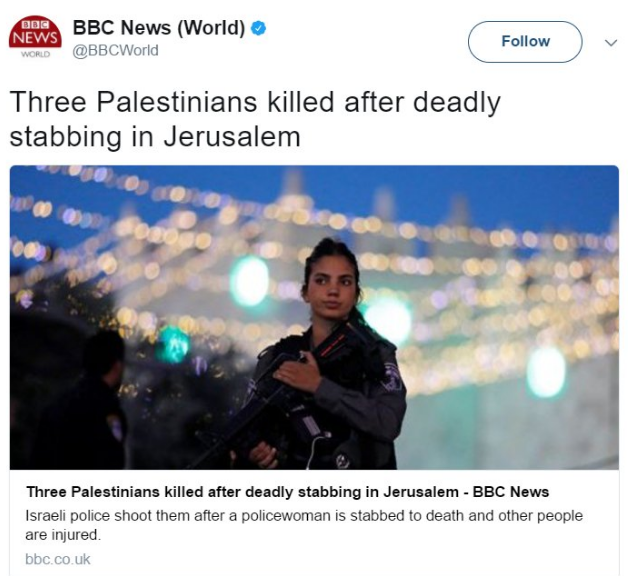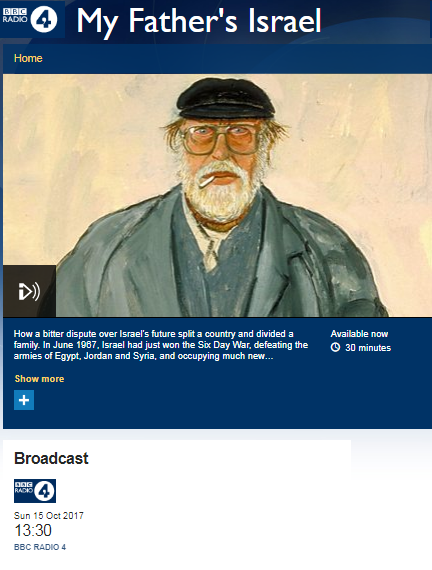Last week we asked “How will the BBC report Hamas’ upcoming botoxed manifesto?” and the answers to that question emerged on May 1st and 2nd after Hamas launched its new document in Qatar.
On the evening of May 1st the BBC News website published a report titled “New Hamas policy document ‘aims to soften image’“. The caption to the image at the top of the article correctly informed readers that:
“Hamas officials say the new document does not replace the group’s 1988 charter”.
In the body of the report itself, that point was further clarified: [emphasis added]
“The new document, which Hamas says does not replace the charter, accepts the establishment of a Palestinian state within territories occupied by Israel in 1967 as a stage towards the “liberation” of all of historic Palestine west of the River Jordan.
This is an apparent shift in Hamas’s stated position, which previously rejected any territorial compromise.
The document says this does not, however, mean Hamas recognises Israel’s right to exist in any part of the land or that it no longer advocates violence against Israel.”
On the morning of May 2nd an article by Yolande Knell appeared in the ‘features’ section of the BBC News website’s Middle East page under the title “How much of a shift is the new Hamas policy document?“. The caption to the image at the top of that report told BBC audiences that:
“The founding charter has not been repealed – but the policy document marks a tonal change”.
However, the fact that this new document does not replace Hamas’ charter was not adequately clarified in the article itself and indeed readers may well have gone away with the mistaken impression that it does just that.
“There have long been reports of possible changes to the 1988 founding charter of the Palestinian Islamic Resistance Movement, best known by its acronym, Hamas.
Three decades ago, it was referring to itself as part of the Muslim Brotherhood and laying out its aim to obliterate Israel, creating an Islamic state on “every inch” of historic Palestine.
In its 36 articles, the 1988 document often uses anti-Semitic rhetoric to describe its struggle as a confrontation between Muslims and Jews.
Now, after years of internal wrangling, Hamas has produced a new policy document, which softens some of its stated positions and uses more measured language.”
The article goes on to portray the new document as follows:
“There is nothing so dramatic as recognition of Israel.
In fact, Hamas restates the Palestinians’ claim to all the land “from the River Jordan in the East to the Mediterranean Sea in the West”.
However, the new document does formally accept the creation of a Palestinian state in Gaza, the West Bank and East Jerusalem – what are known as pre-1967 lines.
This idea has been the basis for previous rounds of peace talks with Israel.”
The implication that Hamas policy is now in line with the principles underpinning years of negotiations between Israel and the PLO is of course inaccurate and misleading. The principles laid down in the Oslo Accords include negotiations on ‘final status’ issues intended to bring the conflict to an end: not to act as an interim agreement for implementation until Israel is eradicated at a later stage.
Knell also told her readers that Hamas has altered its infamously antisemitic position:
“At a press conference in Doha, where he lives in exile, the Hamas leader Khaled Meshaal also stressed a change in approach to the Jewish faith.
“Hamas believes our struggle is against the Zionist occupation, the Zionist enterprise. It’s not a struggle against Jews or Judaism,” he said.”
She did not however clarify that denying the Jewish people the right to self-determination in their own state – which is precisely what a ‘struggle’ against ‘the Zionist enterprise’ is – is one manifestation of antisemitism.
Knell also played down the new document’s renewed committal to terrorism:
“They make clear that Hamas remains committed to what it calls “armed resistance” against Israel.”
As we see from these two reports, the BBC clearly understands that this new document does not replace the Hamas Charter from 1988. That makes it all the more difficult to explain the inaccurate reporting heard by listeners to BBC radio which will be discussed in part two of this post.
Related Articles:




